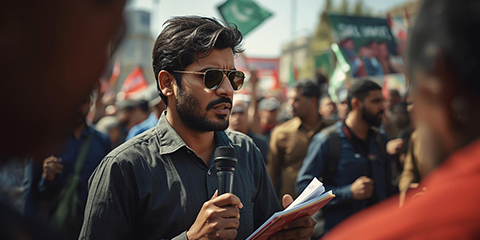Media and journalism: What's the difference?
JournalismPakistan.com | Published: 30 June 2024 | Truth Teller
Join our WhatsApp channel
This article explores the differences between media and journalism within the context of Pakistan. It highlights the responsibilities of both and their impact on society.Summary
ISLAMABAD—In the bustling landscape of Pakistani media, the terms "media" and "journalism" often intermingle, yet they carry distinct meanings and responsibilities that shape how information is shared and consumed. Understanding these differences is crucial for navigating the complexities of modern media environments and appreciating their diverse impacts on society.
Defining Media and Journalism
At its core, media encompasses a vast array of communication channels—from television and radio to online platforms and print publications—that collectively serve to disseminate news, entertainment, and information to the public. It is the expansive ecosystem through which content flows, capturing the attention and shaping the opinions of millions across Pakistan.
Journalism, on the other hand, represents the ethical and professional practice within the media realm. It is the art and science of gathering, verifying, and presenting news and information in a fair, accurate, and unbiased manner. Journalists act as the watchdogs of society, uncovering stories of public interest, holding power to account, and providing a voice to the voiceless.
Navigating the Pakistani Media Landscape
In Pakistan, the distinction between media and journalism can sometimes blur amid the cacophony of 24/7 news cycles, opinion-driven content, and social media influence. The media landscape here is vibrant and diverse, encompassing a mix of state-owned, privately owned, and independent outlets, each with its own editorial stance and audience appeal.
Roles and Responsibilities
While media organizations focus on delivering a wide range of content—news, entertainment, documentaries, and more—journalism remains rooted in core principles of truthfulness, accuracy, independence, and accountability. Pakistani journalists strive to uphold these values despite facing challenges such as censorship, political pressures, and safety concerns.
Impact on Society
The symbiotic relationship between media and journalism profoundly impacts Pakistani society. Media platforms serve as powerful tools for shaping public opinion, influencing policy debates, and reflecting societal trends. Meanwhile, journalism plays a critical role in fostering transparency, fostering civic engagement, and promoting democratic values.
Challenges and Opportunities
In recent years, Pakistani media has faced numerous challenges, including financial sustainability, credibility issues, and the rise of disinformation. Amid these challenges, there are also opportunities for innovation, collaboration, and ethical journalism practices that can strengthen public trust and uphold professional standards.
Looking Ahead
As Pakistan's media landscape continues to evolve, the distinction between media and journalism will remain pivotal. It is essential for media consumers, practitioners, and policymakers alike to recognize and uphold the distinct roles each plays in shaping public discourse and societal progress.
In conclusion, while media serves as the expansive platform for content dissemination, journalism stands as the ethical cornerstone, ensuring that information is conveyed responsibly, accurately, and with integrity. Understanding and respecting these differences are fundamental to fostering a vibrant and informed media environment in Pakistan.
KEY POINTS:
- Media encompasses diverse communication channels like TV, radio, and print.
- Journalism emphasizes ethical practices in news gathering and reporting.
- The media landscape in Pakistan includes state-owned, private, and independent outlets.
- Challenges like censorship and credibility issues affect journalism in Pakistan.
- Understanding the roles of media and journalism is vital for informed public discourse.

























